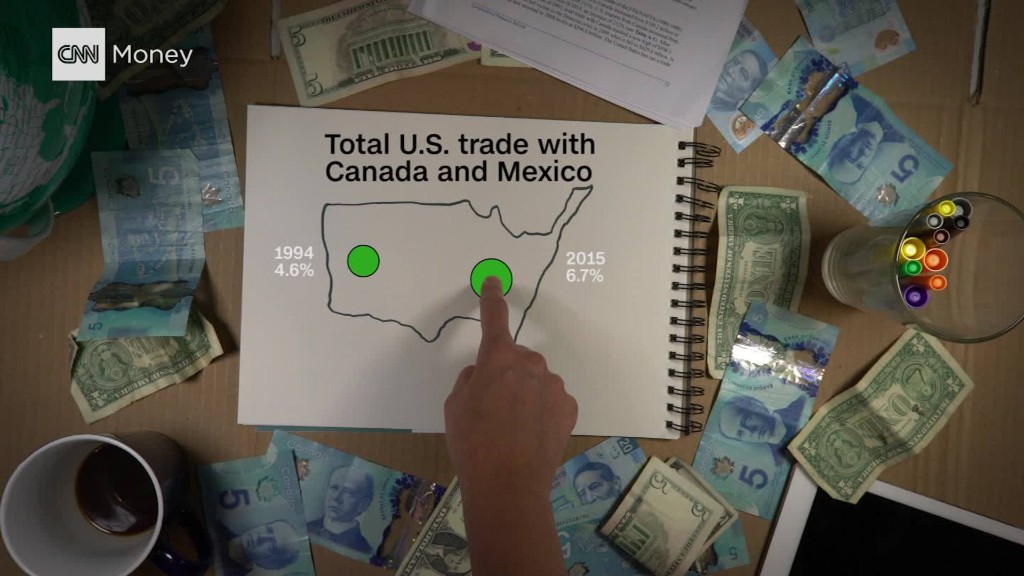
Buckle up: Negotiators from the United States, Canada and Mexico are trying to rewrite NAFTA by the end of the year. That won't be easy.
Experts say the issues are complex. And President Trump insists he wants major changes to a trade pact he considers a raw deal for American workers -- he made reworking it a central promise of his campaign.
The first round of talks to redo the three-nation trade pact concluded in Washington on Sunday.
Representatives from the three countries said Sunday that negotiations will continue at a "rapid pace," adding that "a great deal of effort and negotiation will be required in the coming months."
The countries "are committed to an accelerated and comprehensive negotiation process" that will establish "21st century standards" that benefit citizens, they said in a statement.
Round 2 of the NAFTA talks are set to be held for September 1-5 in Mexico City. The third: late September in Ottawa.
Round 4 will be held in Washington, D.C. in October. In total, seven rounds are expected through December. A U.S. official cautioned that December isn't a firm deadline and that talks could stretch into early 2018.
Still, that's a blinding pace for trade negotiations. The original NAFTA -- which Trump's team blames for the loss of 700,000 American jobs -- took years to negotiate.
Why the rush?
Mexico's presidential election is in July. The current president, Enrique Peña Nieto, can't run again because of term limits. His top trade negotiator, economy secretary Ildefonso Guajardo, has repeatedly warned that he won't be able to sell a new NAFTA to politicians at home once campaigning begins next spring. A new deal needs to get done by the early days of 2018, he has said.
Related: Machines, not Americans, could replace immigrant workers
The first round of NAFTA talks got off to an awkward start last week.
At a press conference on Wednesday, leaders from Mexico and Canada praised the gains NAFTA has brought to all three countries since it became law in 1994. They expressed interest in "modernizing" the agreement.
Robert Lighthizer, the top U.S. trade official, said a few nice things about NAFTA but mostly slammed it as a job-killing, factory-closing deal.
"For countless Americans, this agreement has failed," Lighthizer said.
The three countries started by digging into one of the most sensitive topics -- a part of NAFTA called "rules of origin." It means that a certain amount of the parts in a product must come from across North America. For example, 62% of the parts in a car sold in any of the three countries must come from the region.
The Trump administration sees redoing "rules of origin" as critical to creating more manufacturing jobs.
Lighthizer noted that the United States wants to raise the bar on the amount of parts sourced in North America and in the U.S. That raised eyebrows as to whether the Trump administration would propose specific rules per country to force companies to manufacture more in the United States.
Guajardo, Mexico's top trade official, told CNNMoney in an interview in April that country-specific rules of origin would be a deal breaker.
"There isn't one trade agreement in the world that has country-specific content," Guajardo said.
Round 1 of talks included each of the three sides discussing their expectations about the "rules of origins" issue, according to a Mexican government official. No firm proposals were made.
Related: Renegotiating NAFTA in 14 easy steps
Despite the negotiators' desire to move the talks quickly, experts argue that trade is inherently complicated.
"Nafta 2.0 talks will be difficult and prolonged," says Jeffrey Weiss, a trade expert at the law firm Venable LLP.
And Trump is not looking for small changes.
"I want to be clear that [President Trump] is not interested in a mere tweaking of a few provisions and a couple of updated chapters," Lighthizer said. "We feel that NAFTA has fundamentally failed many, many Americans and needs major improvement."
The clock is ticking for Trump to fulfill a core campaign promise.


